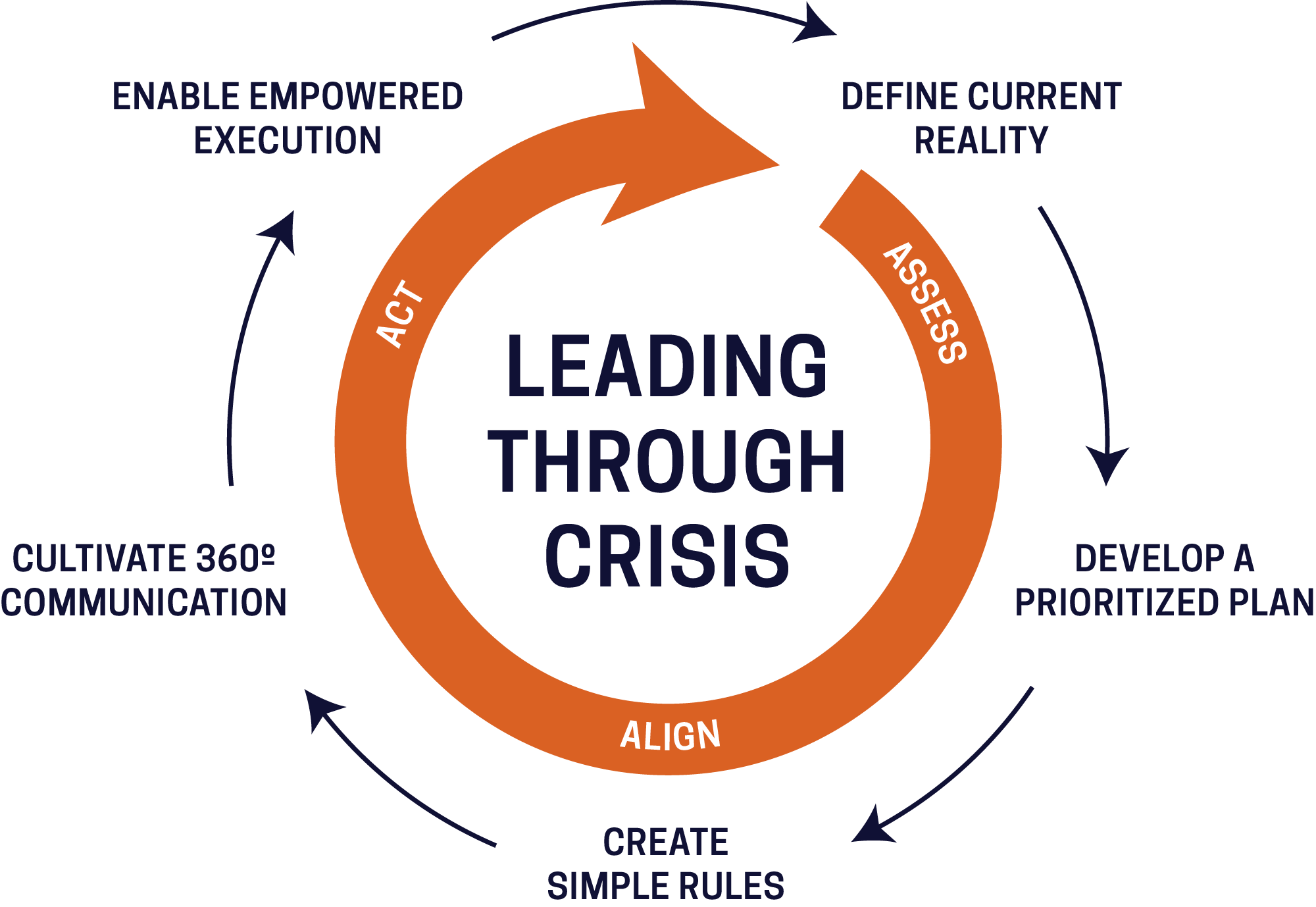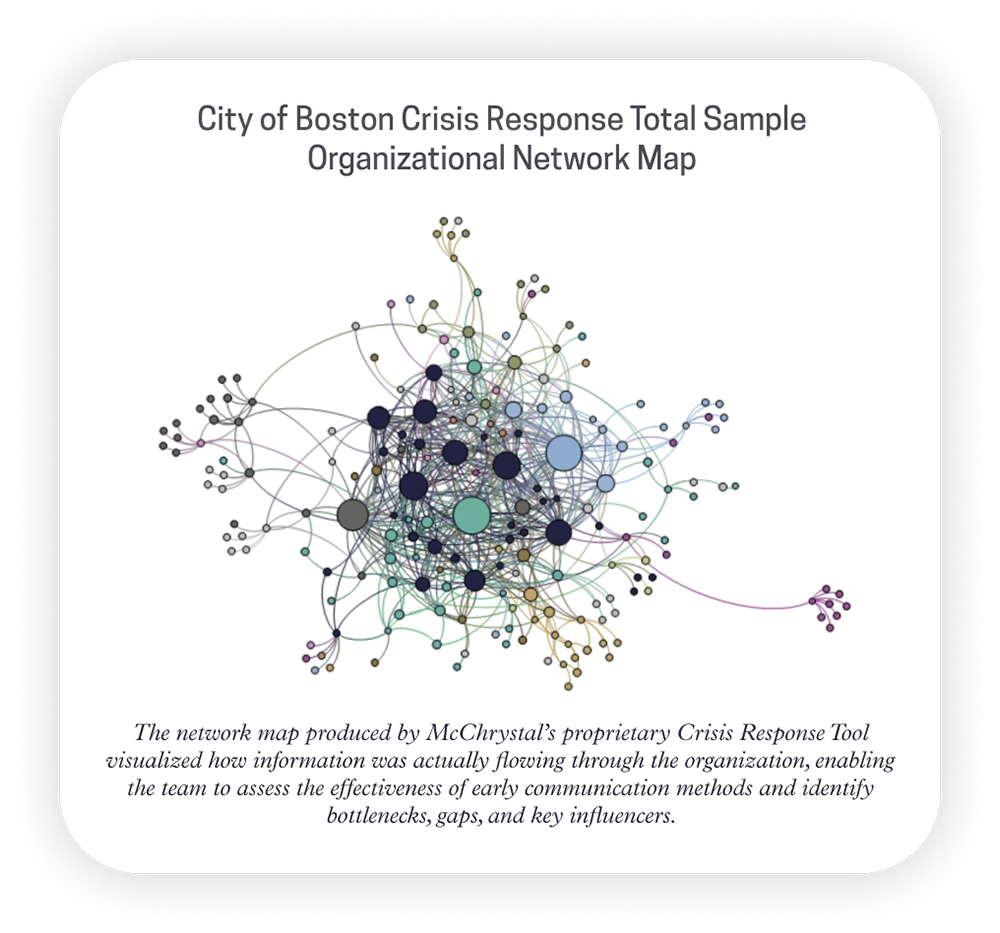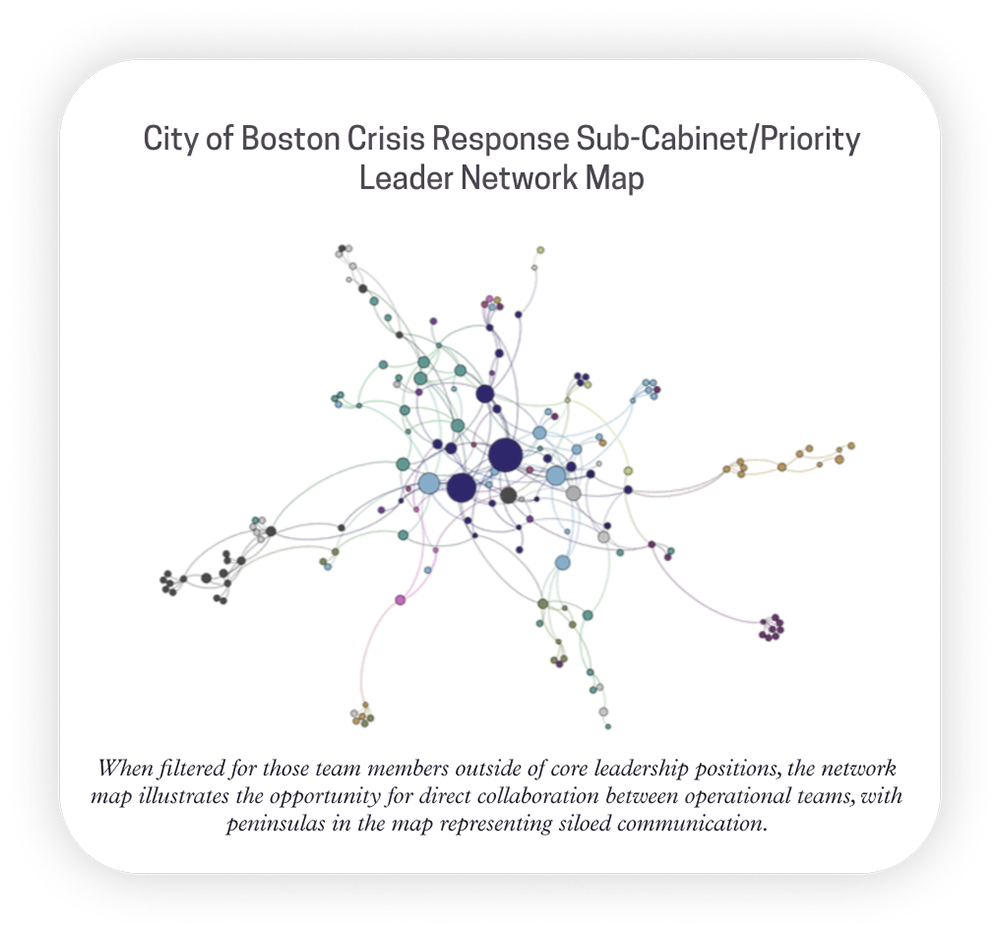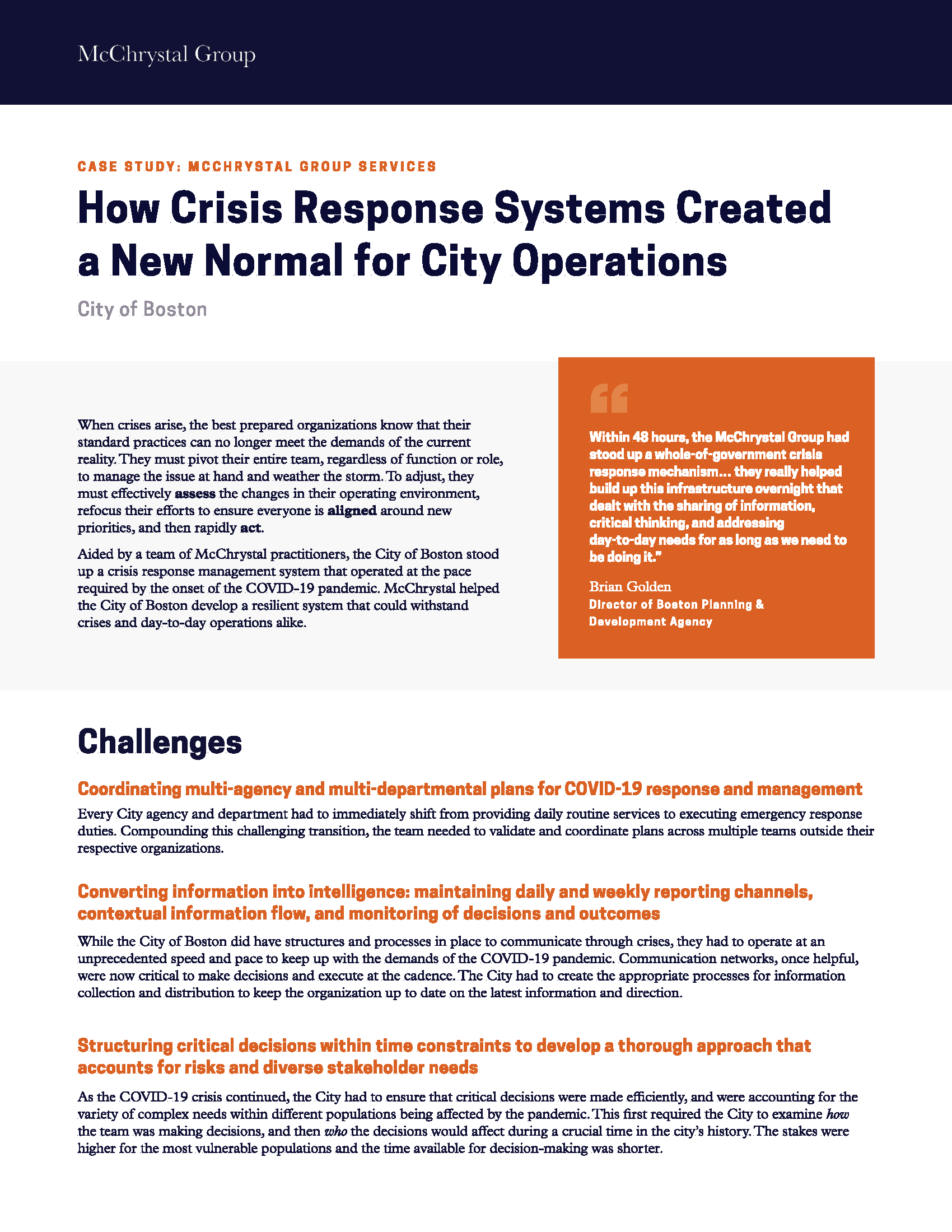At the onset of the pandemic, governments and businesses alike scrambled to understand and respond to their rapidly changing environment. See how an embedded McChrystal team helped the City of Boston rethink the way agencies and departments coordinated and operated to not just respond to crisis but set a resilient foundation for its future.
When crises arise, the best prepared organizations know that their standard practices can no longer meet the demands of the current reality. They must pivot their entire team, regardless of function or role, to manage the issue at hand and weather the storm. To adjust, they must effectively assess the changes in their operating environment, refocus their efforts to ensure everyone is aligned around new priorities, and then rapidly act.
Aided by a team of McChrystal practitioners, the City of Boston stood up a crisis response management system that operated at the pace required by the onset of the COVID-19 pandemic. McChrystal helped the City of Boston develop a resilient system that could withstand crises and day-to-day operations alike.
Within 48 hours, the McChrystal Group had stood up a whole-of-government crisis response mechanism… they really helped build up this infrastructure overnight that dealt with the sharing of information, critical thinking, and addressing day-to-day needs for as long as we need to be doing it.”
Brian Golden
Director of Boston Planning & Development Agency
Challenges
Coordinating multi-agency and multi-departmental plans for COVID-19 response and management
Every City agency and department had to immediately shift from providing daily routine services to executing emergency response duties. Compounding this challenging transition, the team needed to validate and coordinate plans across multiple teams outside their respective organizations.
Converting information into intelligence: maintaining daily and weekly reporting channels, contextual information flow, and monitoring of decisions and outcomes
While the City of Boston did have structures and processes in place to communicate through crises, they had to operate at an unprecedented speed and pace to keep up with the demands of the COVID-19 pandemic. Communication networks, once helpful, were now critical to make decisions and execute at the cadence. The City had to create the appropriate processes for information collection and distribution to keep the organization up to date on the latest information and direction.
Structuring critical decisions within time constraints to develop a thorough approach that accounts for risks and diverse stakeholder needs
As the COVID-19 crisis continued, the City had to ensure that critical decisions were made efficiently, and were accounting for the variety of complex needs within different populations being affected by the pandemic. This first required the City to examine how the team was making decisions, and then who the decisions would affect during a crucial time in the city’s history. The stakes were higher for the most vulnerable populations and the time available for decision-making was shorter.
Solutions
Implementing the “Leading through Crisis” Framework

McChrystal supported the City of Boston with the planning, execution, monitoring, and assessing of COVID-19 response efforts and subsequently in the City’s efforts to re-open civic, economic, and societal activity safely and effectively after the immediate crisis. McChrystal’s solutions were grounded in the Leading through Crisis Framework. The framework takes research, lessons learned, and best practices from U.S. Special Operations Forces and Fortune 500 companies about moving quickly, making decisions rapidly, and executing on-the-spot. This system, while invaluable during times of extreme uncertainty, can also provide needed structure to help siloed teams come together, setting the foundation for effective team operations in all environments.
The Assess, Align, Act steps of the Framework are repeated at a frequency that matches the rate of change in your operating environment. Some of the specific solutions provided by the McChrystal team include:
1. Integration of Inter-Agency Plans: planning across teams and functions – not in siloes
McChrystal advisors partnered with the City of Boston and key stakeholders to drive alignment across agencies, integrate disparate response plans, identify gaps in resource allocation and key interdependencies, and pressure test potential barriers to integrated execution of the plans.
2. Establishing an Integrated Response System: to sharpen communication, adaptability, and accountability
The City’s integrated operations center drove the City’s crisis management. This regular forum, attended by all City leadership, prompted city employees to provide updates on the status of the pandemic, assign actions, coordinate resources, and make decisions. In the early days of the crisis, the team held a daily Crisis Response Forum. Over time, as the City and State moved into a response and recovery posture, the forum transitioned to a twice-a-week Coordinated Leadership Forum.
- Crisis Response Forum
Within days of arriving to Boston, the McChrystal team stood up the Crisis Response Forum, a virtual operations center that facilitated critical information flow and effective decision-making, ultimately driving a unified, whole-of-government response to the challenges presented by the COVID-19 pandemic. - Coordinated Leadership Forum
In the City of Boston’s transition from response to recovery posture, the Crisis Response Forum evolved to the twice-weekly Coordinated Leadership Forum to reflect the changing demands of the environment by recalibrating the focus, cadence, and content. - Crisis Response Tool
The Crisis Response Tool combines network and qualitative analytic disciplines to rapidly assess the communication flow and operating behavior of an organization in a crisis operating environment. McChrystal deployed the Crisis Response Tool to open a feedback loop from the teams after establishing initial operating structure, and to confirm and inform the way leaders approached various aspects of the response.


3. System Process Optimization: getting the City’s teams to work together efficiently
McChrystal advised on the City of Boston’s resourcing and critical information reporting processes to streamline execution of key tasks and provide transparency and timely information flow to decision makers. McChrystal’s primary role was identifying risks, facilitating connections between disparate parties, and providing feedback on potential redundancies or gaps, allowing subject matter experts to develop the most effective processes for their situation.
PPE Requisition & Reporting Processes
Modeling projected PPE needs over time and establishing reporting processes for inventory management.
Emergency Management Public Safety Force Readiness Reporting
Increasing visibility into first responder personnel management.
Crisis Food Access Working Group Integration with other Food Programs
Connecting key teams and distribution programs across the City to share resources and data.
City Department Reopening Process
Centralizing requests for physical space or service delivery modifications to accommodate new protocols.
Impact
The partnership with McChrystal enabled the City government to effectively and safely provide ongoing, equitable support to the City of Boston during the pandemic. The City of Boston expanded medical capacity and medical support Citywide, notably improving processes for PPE acquisition, request management, and distribution. In addition to continuing critical services for residents within new operating restrictions demanded by the environment, the City successfully mobilized food access sites, food distribution, WiFi hotspots and Chromebook dissemination to respond to the abrupt shift in remote learning.
We brought in the McChrystal Group to help us reorganize the operations of city government around a daily crisis response… we worked more collaboratively than ever before. Seven straight months of crisis response has made city government more integrated, more nimble, and more responsive, and we’re going to stay that way. We have broken down silos and we are working with anyone who can help our city move forward, from health centers and nonprofits, businesses and community groups, to colleges and universities. We’re going to keep working together, every single day, to get our city through this pandemic and meet all the challenges that lie ahead.”
Marty Walsh (in remarks to the Boston Chamber of Commerce, September 2020)
Mayor of Boston





